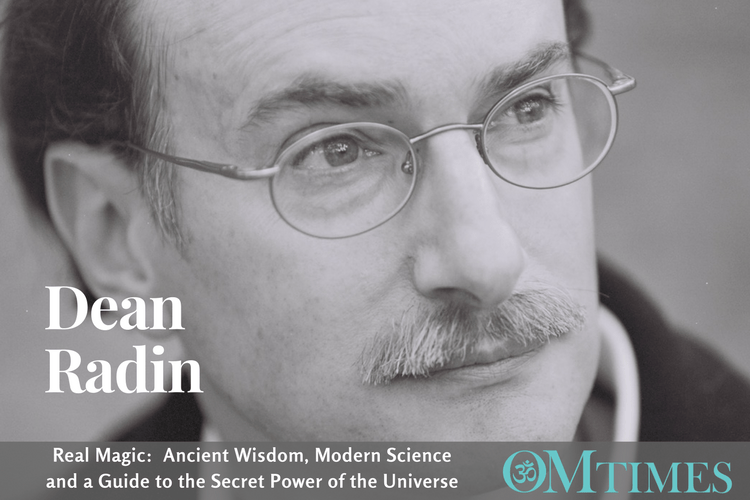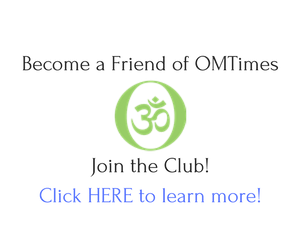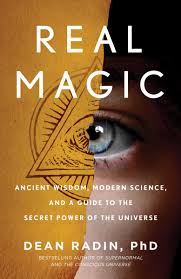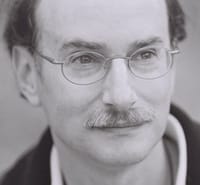Dean Radin: Real Magic, The Secret Power of The Universe

Dean Radin, Ph.D., is Chief Scientist at the Institute of Noetic Sciences and Associated Distinguished Professor of Integral and Transpersonal Psychology at the California Institute of Integral Studies. He’s the author or co-author of hundreds of articles, book chapters and four popular books, The Conscious Universe, Entangled Minds, Super Normal and the recently published Real Magic: Ancient Wisdom, Modern Science, and a Guide to the Secret Power of the Universe.
An Interview with Dean Radin: Real Magic, Guide to the Secret Power of the Universe
Interview by Sandie Sedgbeer To listen to the full interview of Dean Radin by Sandie Sedgbeer on What Is Going OM on OMTimes Radio, click the player below.
To listen to the full interview of Dean Radin by Sandie Sedgbeer on What Is Going OM on OMTimes Radio, click the player below.
Sandie Sedgbeer: Now, you’ve been probing the far reaches of human consciousness, principally psi phenomena, using the tools and techniques of science for nearly four decades. Few scientists 40 years ago would have admitted an interest in magic let alone published a book on the subject. And yet, your latest book, Real Magic, carries endorsements from many distinguished names in the fields of science, medicine, and psychology. How did yesterday’s sorcery become today’s leading-edge science?
Dean Radin: If you look at leading-edge science today, for those who are interested in consciousness, as a topic of study is relatively new within the past 30 years or so, for people interested in consciousness, the underlying puzzle has been to account for the experience just for simple self-awareness and experience. And the reason it’s a puzzle is that we don’t know something which doesn’t appear to be a physical effect or experience doesn’t have correlates in the brain, neuro correlates, but we don’t see how experience can arise simply from matter and energy.
Because of that, there’s a growing number of scientists in many domains, and philosophers who are beginning to suspect that there’s something about consciousness that might simply be woven into the fabric of reality.
And that’s immediately going to lead us into the esoteric traditions. Since I’ve been studying phenomena that already give us a clue about  what consciousness can do, mainly psychic and mystical experiences. I decided to look at the esoteric literature, as well and discovered to my surprise that the psychic experiences that I’ve been studying are essentially the same as what has traditionally been called magic. So, two years ago, before I started writing my book Real Magic, I probably would have said, no, I’m not studying magic at all, that’s just ancient superstition. Today, I’m not so sure, especially after spending a year looking in some detail at what the esoteric traditions were actually saying about these kinds of phenomena.
what consciousness can do, mainly psychic and mystical experiences. I decided to look at the esoteric literature, as well and discovered to my surprise that the psychic experiences that I’ve been studying are essentially the same as what has traditionally been called magic. So, two years ago, before I started writing my book Real Magic, I probably would have said, no, I’m not studying magic at all, that’s just ancient superstition. Today, I’m not so sure, especially after spending a year looking in some detail at what the esoteric traditions were actually saying about these kinds of phenomena.
Sandie Sedgbeer: Well, it’s interesting, isn’t it, because as you reveal in your book, there is so much material available on magic. Many of the ancient, the old books, the Eliphas Levi, you know, Aleister Crowley, Dion Fortune, all of those. I read those many years ago, and were you surprised by how much is out there?
Dean Radin: Well, it’s not only that there’s a vast literature on what might be thought of as a popular level, but in the scholarly domain, I was just amazed at how many historians, anthropologists, historians of religion, religious scholars have written probably hundreds of thousands of books about magic. The reason is that it’s deeply entwined in our understanding of religion and in our understanding of science and in history and in politics, almost everything you can think of at some point is related to what people thought of as magic.
As a scientist, I’ve been particularly interested in seeing that what we today reject as magic at one time was all we knew. The word magic was basically the only term that we had to try to describe the way the world worked.
Some elements of supernatural magic, which had to do with divine concepts, eventually became natural magic. Natural magic became alchemy, astrology, and the herbalism. Those elements of natural magic are now part of mainstream science.
What’s interesting is that other elements almost became natural magic and that all had to do with consciousness. So, it may be that it took us another couple of hundred years to develop a fourth form of natural magic, and my prediction then is, as I say in the book, that I think the future of science will have to incorporate consciousness. And when it does that, it will look backward in history and see that what used to be called magic is yet just another thing that we’re beginning to understand.
Sandie Sedgbeer: You say that real magic as opposed to the magic that’s performed on stage, slight of hand, etc., real magic falls into three categories or types. Tell us what they are.
 Dean Radin: So, one type is divination. The typical, stereotypical image is mirror gazing or crystal ball gazing or tarot cards, that sort of thing. A second class I call the force of will, which is about manifesting your desires. And the third is called theurgy, which is communicating with spirits or getting spirits to do something on your behalf.
Dean Radin: So, one type is divination. The typical, stereotypical image is mirror gazing or crystal ball gazing or tarot cards, that sort of thing. A second class I call the force of will, which is about manifesting your desires. And the third is called theurgy, which is communicating with spirits or getting spirits to do something on your behalf.
So, that’s a whole range of different kinds of magical practices basically fall into those three categories. So, interestingly, in divination, in modern language, we would say that it involves clairvoyance and precognition. That’s what divination was about. The force of will is what we would call either mind-matter interactions or psychokinesis. And theurgy would fall into a class of studies on mediumship, near death experience, out of body experience and so on.
These ancient practices have been studied scientifically, but the connection with what we do in the laboratory with these ancient practices has more or less been ignored.
Sandie Sedgbeer: You’ve said that it’s the ancient wisdom, a lot of the esoteric traditions where we will find clues about the next big advancements in science. Can you explain that to me?
Dean Radin: So, if you try to do a synthesis of the esoteric traditions regarding their cosmology, their worldview, you can get lost in the differences between saying hermeticism and Neoplatonism where the Kabbalah and what the Rosicrucian said. There are differences.
But, if you start looking at the similarities to find out what’s common, you do find a commonality- Consciousness. It’s been called the Perennial Philosophy, and ultimately, it says that consciousness is fundamental. Interestingly, you find the same thing in the Eastern esoteric traditions. So, both Eastern and Western traditions, in fact, all the way back to Shamanism, you will find what amounts to the same notion, that somehow consciousness is a fundamental aspect of reality.
That’s relevant then to scientific understanding because it requires a change to our scientific worldview because science does not actually consider consciousness to be fundamental at all. It considers it to be an emergent property of brain activity. If you think the worldview of science as a way of chopping up the world into different categories, which is how we do in the academic world, then from a science perspective, physics would be at the bottom, and then we have chemistry above that and biology and then psychology and so on.
Somewhere near the top of that hierarchy is where science currently imagines consciousness to arise. What the esoteric traditions say is that that view, that worldview is actually not correct. Instead, that below physics, there’s another layer, and that other layer is consciousness. So, from consciousness emerges the physical world and from there emerges chemistry and there emerges biology and so on.
So, if this more expansive view is correct, it wouldn’t change any of our science at all. This is one of the fears I often hear, that my colleagues in the academic world will say, well, we’d have to throw away our textbooks. If magic is real, everything goes away. And I say, no, everything stays exactly the same. All that we’re doing is adding on a new underlying assumption. From that new assumption, then phenomena that are normally thought of as anomalies, like psychic phenomena is an anomaly from a scientific perspective, well, then it’s no longer an anomaly. It would be expected to occur because consciousness is before the physical world, meaning it’s before space and time, which means that consciousness should be able to perceive through what we see as time because it’s before time.
Continue to Page 2 of the Interview with Dean Radin
A veteran broadcaster, author, and media consultant, Sandie Sedgbeer brings her incisive interviewing style to a brand new series of radio programs, What Is Going OM on OMTimes Radio, showcasing the world’s leading thinkers, scientists, authors, educators and parenting experts whose ideas are at the cutting edge. A professional journalist who cut her teeth in the ultra-competitive world of British newspapers and magazines, Sandie has interviewed a wide range of personalities from authors, scientists, celebrities, spiritual teachers, and politicians.




